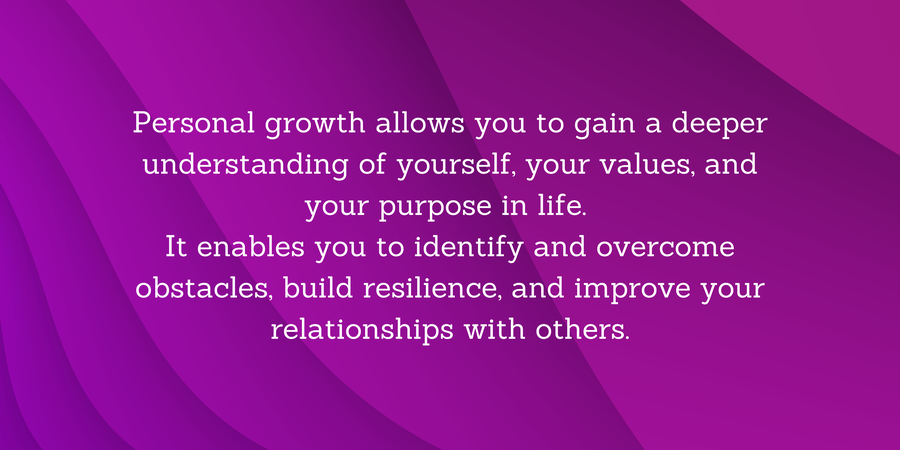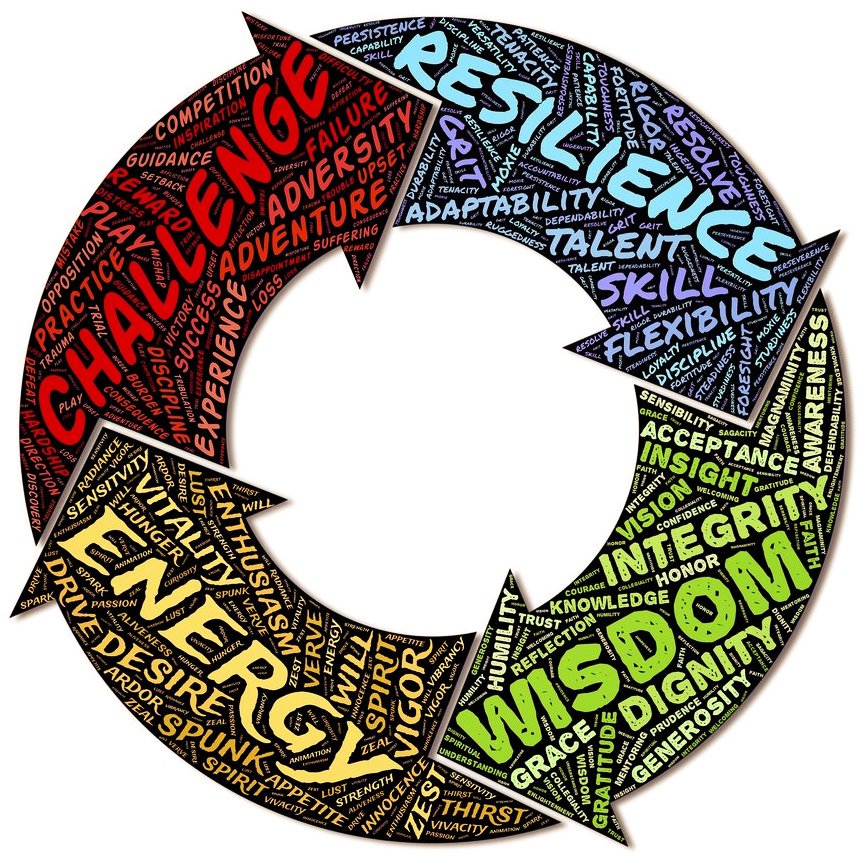A brief definition of self-awareness
Self-awareness is the ability to recognize and understand your thoughts, emotions, and behaviors. It requires a conscious effort to look within and confront our inner selves, and it’s a crucial element in personal growth.
When you’re self-aware, you’re able to recognize your strengths and weaknesses, your triggers, and your emotional responses. This knowledge can help you make more conscious choices and decisions that are in line with your goals and aspirations, and to develop a deeper understanding of yourself.
Without self-awareness, it’s easy to get stuck in patterns of behavior and thinking that may be holding you back. Therefore, developing self-awareness is essential for personal growth.
If you’d like to read more about self-awareness you can go to:
The Journey to Self-Awareness: 6 Steps to Discovering Your True Identity
What is Personal Growth and Why is it Important
Personal growth is the process of improving ourselves through self-reflection, self-discovery, and intentional actions. It involves a continuous journey of self-improvement, personal development, and self-awareness.
It is a quest to understand ourselves better and to become the best version of ourselves that we can be. It’s important to understand what makes us tick, what we value, and what motivates us so we can make the most of our potential.
Personal growth is important because it allows you to gain a deeper understanding of yourself, your values, and your purpose in life. It also enables you to identify and overcome obstacles, build resilience, and improve your relationships with others.
It also involves various aspects of your life, including physical, emotional, intellectual, and spiritual development. It entails setting goals, creating a plan of action, and taking steps toward achieving those goals.
It also involves cultivating positive habits, such as practicing self-care, seeking new experiences, and challenging yourself to step outside of your comfort zone.
It leads to a more fulfilling and meaningful life. It helps you to develop a greater sense of purpose, increased self-confidence, and a stronger sense of identity. It also enables you to cope with challenges and setbacks more effectively, and to develop healthier relationships with yourself and others.
Ultimately, personal growth is a lifelong journey that requires dedication, self-reflection, and a willingness to learn and grow.

6 Great Self-Awareness Tips for Personal Growth
In this section, we will provide six actionable tips that you can implement to develop your self-awareness and promote personal growth.
These tips are easy to incorporate into your daily routine and will help you to become more in tune with yourself and your surroundings.
1. Emotional awareness & Self-reflection
Emotional awareness and self-reflection are two powerful tools for developing self-awareness. Emotional awareness is the ability to identify and understand your emotions, as well as the emotions of others.
When you are emotionally aware, you can manage your emotions effectively, which can lead to better decision-making, healthier relationships, and improved overall well-being.
Related article: The Power of Self-Awareness in Managing Your Emotions: A Step-by-Step Guide
Self-reflection is the process of examining your thoughts, feelings, and actions to gain insight into your behavior and motivations. It is an important aspect of personal growth because it allows you to learn from your experiences and make changes as needed.
By regularly reflecting on your behavior, you can identify patterns, set goals, and make progress toward becoming the best version of yourself.
There are many benefits to self-reflection. It helps you develop a deeper understanding of yourself, your strengths, and your weaknesses. It allows you to identify areas of your life where you may need to make changes and develop a plan to address them.
One way to make time for self-reflection is to schedule regular alone time. This can be as simple as taking a walk in nature or finding a quiet space to meditate. During this time, try to reflect on your experiences, emotions, and behaviors.
You may find it helpful to journal or write down your thoughts, as this can help you gain clarity and organize your ideas.
By practicing emotional awareness and self-reflection, you can develop a deeper understanding of yourself, improve your relationships, and make meaningful progress towards your personal goals.
2. Shadow work
Shadow work is a practice that involves exploring and addressing the parts of ourselves that we typically keep hidden or repressed, often referred to as our “shadow” or “dark side”.
These may include emotions, thoughts, memories, beliefs, biases, and behaviors that we are ashamed of, fear, or simply do not want to acknowledge.
Engaging in shadow work can be a powerful tool for self-awareness and personal growth, as it allows us to confront and integrate these hidden aspects of ourselves.
By shining a light on our shadow, we can gain a deeper understanding of our motivations, fears, and desires, and learn to accept and embrace all parts of ourselves.
Shadow work can take many forms, including journaling, therapy, meditation, and creative expression. It often involves exploring uncomfortable emotions and experiences and may require the support of a therapist or mentor to navigate safely.
Although shadow work can be challenging and uncomfortable at times, it can also be incredibly liberating and transformative. By facing our shadow with compassion and curiosity, we can move beyond limiting beliefs and behaviors.
3. Reading personal development books or listening to audiobooks
Reading personal development books or listening to audiobooks can be an effective way to enhance self-awareness and facilitate personal growth. These cover a wide range of topics and offer various perspectives and strategies for improving yourself.
Reading or listening to personal development materials can help you gain new insights and perspectives on your life, relationships, and career. These materials can provide a source of motivation and inspiration, and help you identify areas in which you would like to improve.
In addition to providing valuable insights, personal development material often offer practical exercises, tips, and strategies for developing self-awareness and improving personal transformation. They may cover topics such as emotional intelligence, mindfulness, communication, and goal-setting, among others.
It is important to note that not all personal development materials are created equal, and it may take some trial and error to find books or audiobooks that resonate with one’s particular goals and interests.
It is also important to approach these materials with an open mind and a willingness to apply the lessons and strategies in one’s own life.
In my personal experience, some of the best authors I’ve found are Dr. Wayne W. Dyer, Neville Goddard, Napoleon Hill, Abraham-Hicks, Steven Pressfield, and Wallace D. Wattles. Of course, there are many others, and it’s up to you to find the ones you resonate with.
In summary, reading personal development books or listening to audiobooks can be a valuable tool for enhancing self-awareness and personal growth. They can provide new insights, motivation, and practical strategies for improving oneself.

4. Take a Social Media Detox
Taking a break from social media is another great technique for personal growth. Social media can be addictive and overwhelming, often causing us to compare our lives with others and feel inadequate.
Taking a break from social media can help you gain clarity and perspective on your own life and priorities.
A social media detox involves taking a break from social media platforms for a certain period of time. This can be a few days, a week, a month, or even longer depending on your preference.
During this time, you can focus on connecting with yourself and the people around you without the distraction of social media.
When you do this, you may find that you have more time and energy to pursue other activities that bring you joy and fulfillment. You may also discover that you feel more present and mindful in your daily life, as you are not constantly distracted by notifications and updates from social media.
To take a social media detox, consider deleting the apps from your phone or blocking the websites on your computer. You can also let your friends and family know that you will be taking a break from social media, so they can reach out to you through other means if necessary.
Remember, a social media detox is not a punishment or a permanent solution. It is simply a way to take a break and reconnect with yourself.
After your detox period is over, you can choose to return to social media in a more mindful and intentional way, setting boundaries and using it as a tool for connection rather than a source of distraction and comparison.
5. Movement and body awareness
By tuning into the sensations and movements of your body, you can gain a deeper understanding of your physical, mental, and emotional state.
Body awareness involves paying attention to the sensations in your body, such as tension, relaxation, warmth, and coolness. It is about being present in the moment and experiencing your body without judgment.
Movement awareness, on the other hand, involves being aware of the way you move, how your body feels as you move, and the emotions that arise from movement.
Practicing body and movement awareness can have many benefits for your self-awareness journey. It can help you identify physical or emotional tension in your body, which can be a sign of stress or anxiety.
By paying attention to your body and movements, you can learn to identify triggers that may cause certain emotions or behaviors.
One technique for practicing movement and body awareness is to engage in mindful movement practices such as yoga, tai chi, or dance. These practices involve moving your body in a slow, deliberate, and intentional way, paying attention to each movement and sensation.
This can help you develop a deeper connection to your body and gain a greater sense of self-awareness.
Another technique is to simply take a mindful walk or engage in physical activity that you enjoy. As you move, focus your attention on the physical sensations in your body and the way your body feels.
Notice the muscles you engage and relax, the way your feet make contact with the ground and the rhythm of your breath.
Overall, these can be great tools for developing self-awareness. By tuning into the sensations and movements of your body, you can gain a deeper understanding of yourself and your emotions.
6. Set personal goals & constantly get out of your comfort zone
When you set goals, you create a roadmap that helps you focus your energy and attention on what’s important to you. Goals provide direction, motivation, and a sense of purpose that can help you stay on track even when things get tough.
To make the most of goal-setting, it’s important to set goals that are both challenging and achievable.
Goals that are too easy won’t motivate you to push yourself, while goals that are too hard can be overwhelming and discouraging. Ideally, you want to set goals that stretch your abilities but are still within your reach.
One way to set challenging goals is to constantly get out of your comfort zone. When you do things that scare you or challenge you, you expand your abilities and increase your self-awareness.
You discover new things about yourself and learn how to handle new situations, which builds confidence and resilience.
Getting out of your comfort zone can take many forms, but the key is to find opportunities to stretch yourself in ways that feel meaningful, exciting, and even a bit uncomfortable.
For example, you might take up a new hobby that challenges you, like rock climbing or martial arts. Or you might volunteer for a project at work that’s outside of your usual expertise. Or you might sign up for a public speaking class or join a Toastmasters group to work on your public speaking skills.
By constantly challenging yourself and setting new goals, you’ll be amazed at how much you can achieve and how much you can learn about yourself. You’ll develop new skills, build confidence, and cultivate a growth mindset that will serve you well in all areas of your life.

Practice Gratitude
A gratitude practice involves intentionally focusing on the good things in life, expressing appreciation for them, and acknowledging the people and circumstances that contribute to them.
Practicing gratitude can be a powerful tool for developing self-awareness because it helps us to become more mindful of our thoughts and emotions.
When we make a habit of focusing on the positive aspects of our lives, we become more attuned to how we experience joy, happiness, and contentment. This can lead to a greater sense of self-awareness, as we become more in tune with our feelings and motivations.
Moreover, gratitude practice can also help to cultivate a more positive outlook on life, which can improve our overall well-being.
By focusing on what we have to be grateful for, we can shift our attention away from negative thoughts and emotions, and begin to view our lives through a more positive lens. This can lead to greater self-confidence, improved relationships with others, and a greater sense of purpose and meaning in life.
Related article: The Beginner’s Guide to Gratitude: How It Can Help You Live a Happier, More Fulfilling Life
In Conclusion
In conclusion, self-awareness is essential for personal growth, and there are various techniques that you can use to improve it.
By regularly practicing self-awareness techniques like emotional awareness, self-reflection, reading personal development books, taking a social media detox, constantly getting out of your comfort zone, and feeling gratitude and appreciation constantly, you can gain a deeper understanding of yourself and your emotions.
Through these techniques, you can enhance your overall well-being and lead a more fulfilling life. By dedicating time and effort to self-awareness, you can achieve personal growth and become the best version of yourself.


0 Comments